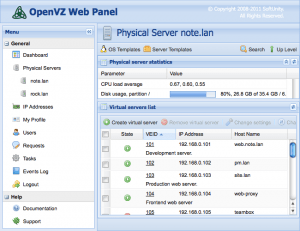What are the Pros and Cons of OpenVZ?
OpenVZ is a popular Linux kernel-based virtualization technology widely used for creating virtual private servers (VPS hosting). This technology has its pros and cons, which are important to consider when choosing the right solution for your project. Let’s look at the main advantages and disadvantages of OpenVZ.Pros of OpenVZ
- Resource efficiency. OpenVZ allows you to efficiently use computing resources and provides good performance under light loads.
- Ease of management. Managing virtual servers in OpenVZ is quite simple, making it a great choice for beginner users.
- Fast installation. Creating a new virtual server in OpenVZ takes a minimum of time thanks to containerization technology.
- Resource isolation. Each container in OpenVZ has separate dedicated resources, which ensures a high level of security and stability.
Cons of OpenVZ
- Limitations in settings. OpenVZ has limited options for configuring the kernel and operating system at the container level, which may be a drawback for experienced users.
- Dependency on the host node. Since all virtual servers in OpenVZ use a common operating system kernel of the host node, host-level failures can affect all containers.
- Need for pre-configuration. OpenVZ requires a certain amount of host node and container configuration for optimal performance, which can be difficult for beginners.
- Limitations in OS selection. When using OpenVZ, you are limited to the choice of operating systems that are supported by containerization.
In conclusion, when choosing between OpenVZ and other virtualization technologies, it is important to consider both its advantages and disadvantages. OpenVZ is suitable for small projects with limited resources and security requirements, but may not be suitable for large and heavily loaded projects. Before making a decision, it is recommended to test and analyze the requirements of your project.




